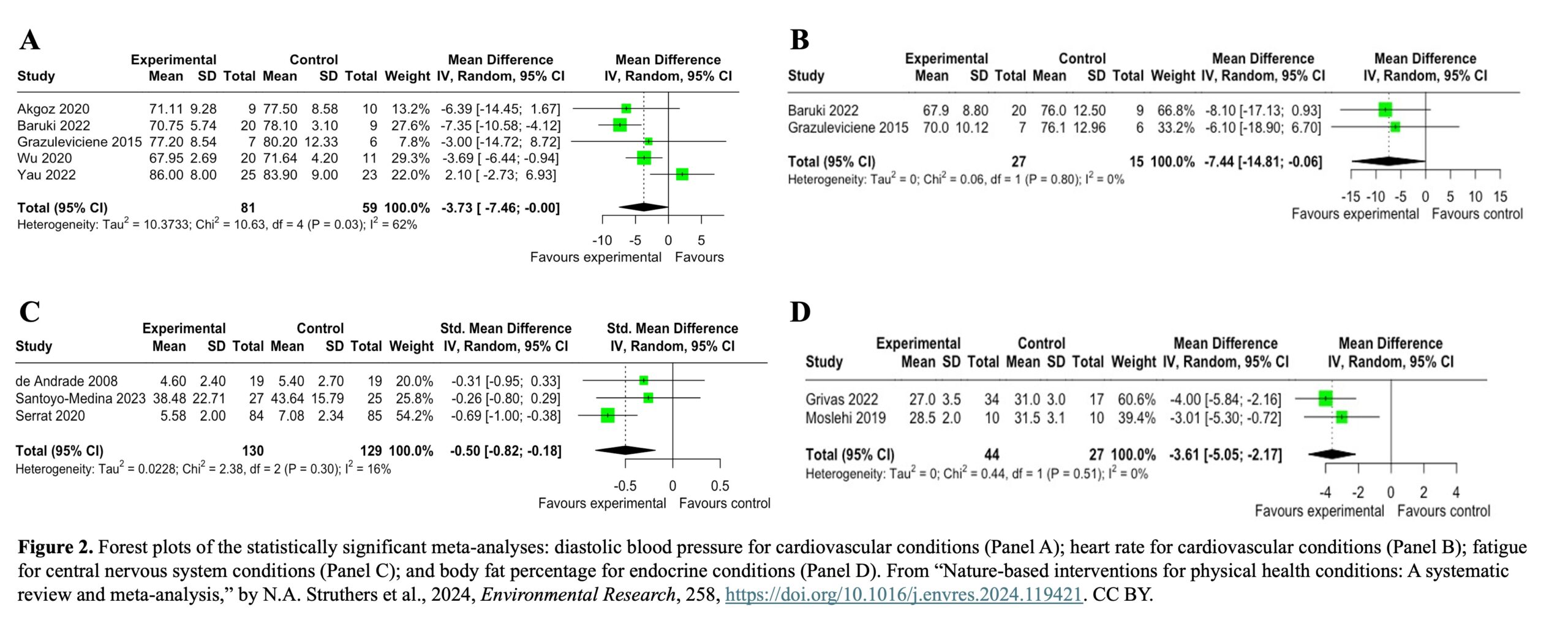On January 25, 2023, my PhD supervisor sat me down and asked me to visualise what I would like to see created to support the use of nature-based interventions (NBIs) in healthcare. The image was clear: I wanted to see a handbook of NBIs, outlining different NBIs, the potential benefits and risks, and who they should be recommended to. Taking inspiration from the handbooks seen in clinical settings, such as physicians’ drug handbooks, I proposed a systematic review that would set the foundation to actualise my vision.
A year and a half later, my paper, “Nature-based interventions for physical health conditions: A systematic review and meta-analysis”, was published (Struthers et al., 2024). In order for my dream NBI handbook to be developed, I needed to investigate the effects of NBIs on pre-existing health conditions. To do so, my co-authors and I conducted a systematic review and meta-analysis of physical health outcomes and biomarkers of physical health conditions. We intentionally conducted the meta-analyses of health outcomes grouped by body system disease classification to report condition-specific effects, rather than reporting the effects as a generalised population which previous meta-analyses have done.
We included 26 papers in the systematic review, 15 of which were able to contribute data to the meta-analyses. Seventeen meta-analyses were conducted: 6 for cardiovascular conditions, 4 for central nervous system conditions, 3 for endocrine conditions, 2 for musculoskeletal conditions, and 2 for respiratory conditions. Four meta-analyses showed significant effects in favour of NBIs compared to control groups: diastolic blood pressure (MD -3.73 mmHg [-7.46 to −0.00], I2 = 62%) and heart rate (MD -7.44 bpm [-14.81 to −0.06], I2 = 0%) for cardiovascular conditions, fatigue (SMD -0.50 [-0.82 to −0.18], I2 = 16%) for central nervous system conditions, and body fat percentage (MD -3.61% [-5.05 to −2.17], I2 = 0%) for endocrine conditions. Although meta-analyses of several health indicators did not show statistically significant effects, their point estimates are consistent in the direction we expected based on theory and previous literature.

Nicole Struthers
PhD candidate and MPT student at the University of Western Ontario
Nicole A. Struthers is a combined MPT/PhD student based in Ontario, Canada. Her doctoral research program focuses on the use of nature in healthcare. Specifically, she is working on developing a nature prescription framework and intervention for knee osteoarthritis.

NBIs are positioned to be useful interventions for clinicians to consider integrating into disease management, given the benefits on common experiences of people living with chronic health conditions. Furthermore, NBIs offer themselves to play a valuable role in sustainable healthcare, including physical therapy. Using NBIs as alternatives to current health interventions with a higher carbon output can foster planetary health by reducing the carbon emissions from healthcare systems whilst benefiting the health of patient populations.
Although this review has its limitations, it has set the stage for the development of a NBI handbook to be used by health practitioners, as well as policy makers and academics. This paper is the first systematic attempt to move the knowledge base of NBIs and greenspace exposure in the direction of stratified analyses of health outcomes by health condition. We hope it provides value to all readers and supports the early roll out of NBIs by clinicians as further research evidence continues to build.
References
Header image by
Struthers, N. A., Guluzade, N. A., Zecevic, A. A., Walton, D. M., & Gunz, A. (2024). Nature-based interventions for physical health conditions: A systematic review and meta-analysis. Environmental Research, 258, 119421. https://doi.org/10.1016/j.envres.2024.119421


An interesting paper or study that would compliment your current study would be the health effects of an environment that has been “stripped of nature” such as highly industrialized areas, with limited green space, exposure to toxic industrial chemicals and air pollution. What are the disease rates for individuals who live in these types of areas, versus the disease rates for people living in highly rated greenspaces, such as Bolder Colorado, and Greensboro, NC? Also what are the demographics of these populations? Age, Race, Sex, Gender etc
Thank you for this work. It is very helpful for those of us trying to disseminate the message of the benefits of NBIs.